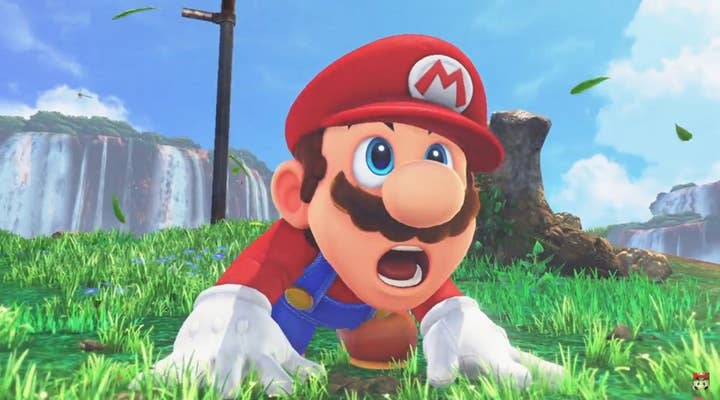Guessing Nintendo's next move | 10 Years Ago This Month
With the Wii U struggling and the company signaling changes, January of 2014 saw lots of people take (mostly wrong) guesses at what Nintendo would do next
There are a few things you can pretty much always count on with a Nintendo system.
The first-party software will be excellent.
It will be cheaper than the systems it is competing against.
If you're talking about anything after the Gamecube, the hardware will be designed around a gimmick of some sort.
The online service will be designed by someone who has presumably never seen a rival platform's online service, or even had such a thing described to them.
Beyond that, it's anybody's guess what Nintendo is going to do next, and it's a bit of a fool's game to try and guess.
But 10 years ago this month, that was a very popular game indeed as Nintendo posted yet another quarter of disappointing sales and slashed its forecast for the full year, turning the projection from a ¥55 billion net profit into a ¥25 billion net loss.
It was so bad Nintendo CEO Satoru Iwata took a salary cut for the second time in three years and had to address calls for his resignation since he had previously committed to investors that the company would finish the year in the black.
"It is clear to us that the old Nintendo model of proprietary hardware supported by compelling proprietary software is broken"Michael Pachter
When he said at a press conference that Nintendo was "thinking about a new business structure" and "studying how smart devices can be used to grow the game-player business," that got people pondering about what lay ahead for Nintendo in a world where it wasn't competitive on the console front and the dedicated handheld market was assumed by many to have fallen victim to smartphones and tablets.
With the company clearly open to big changes, people put on their cosplay plumbers' caps to consider what those changes should look like.
"It is clear to us that the old Nintendo model of proprietary hardware supported by compelling proprietary software is broken," Wedbush analyst Michael Pachter told investors.
Pachter didn't suggest getting out of consoles entirely, but he did want to see Nintendo pull the plug on the Wii U and start making games for the PS4 and Xbox One until the Wii U's successor was ready, at which point it would un-ring the bell and stop publishing as a third-party.
As for the handheld business, Pachter wanted to see Nintendo expand into mobile by putting older GBA games on mobile for $5 or $10 and hope that wins people over and gets them to buy new games on 3DS.
Needless to say, those things didn't happen.
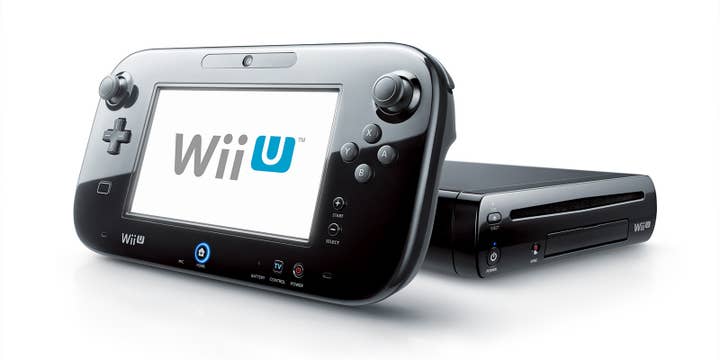
Asif Khan, CFO of investment firm Virtue LLC, wrote a guest editorial for us about what Nintendo's next steps should be.
First, he agreed with Pachter about releasing older Nintendo games on mobile.
He suggested they release a system that could compete with its rivals on horsepower.
He suggested investing in (or outright buying) Oculus to get in on the VR wave that was still building in hype at the time.
He suggested acquiring Sega or Capcom.
Lots of swings and misses there, but Khan get full marks for his suggestion that Nintendo should license its IP out for film and TV. It's been slow going on that front, but it's hard to argue with the results of the Super Mario Bros. Movie (and Detective Pikachu, depending on how much credit you give Nintendo for the ways Pokémon is handled).
Even Nintendo wasn't so great about predicting what Nintendo would do.
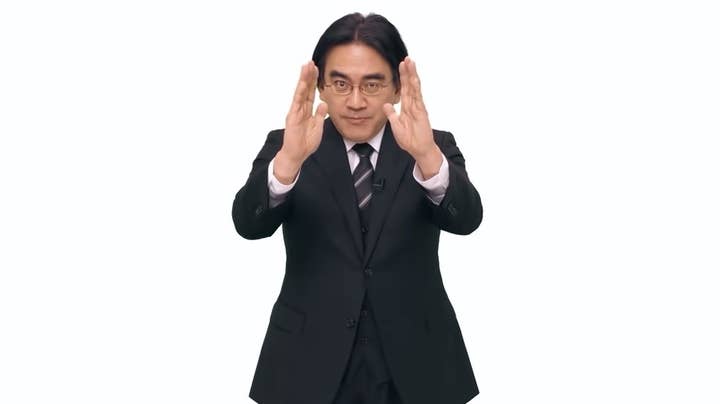
In a meeting with investors at the end of the month, Iwata said the company's top priority for 2014 was "to offer software titles that are made possible because of the GamePad."
It's fair to say the company fell short of that goal, as Nintendo's 2014 Wii U lineup was headlined by Mario Kart 8, Super Smash Bros. for Wii U, Bayonetta 2, Captain Toad: Treasure Tracker, and Donkey Kong Country: Tropical Freeze. That's a pretty strong software lineup of games, but none of them made a compelling argument for the GamePad's existence. With the exception of Smash Bros. for Wii U, all of those games were also re-released on Switch, where I feel comfortable guessing they outsold their original incarnations by a fair margin.
Iwata also talked about the end of "device-based relationships" with customers, saying Nintendo Network IDs that had been rolled out across the 3DS and Wii U would be the "new definition of a Nintendo platform."
That definition didn't last very long, as Nintendo in 2015 announced its move to a separate Nintendo Account system, which it would use for mobile titles and the Switch.
Then there was the big one: the quality-of-life platform.
"Our first step into a new business area in our endeavour to improve [quality of life] is the theme of 'Health'"Satoru Iwata
"While we will continue to devote our energy to dedicated video game platforms, what I see as our first step into a new business area in our endeavour to improve [quality of life] is the theme of 'Health,'" Iwata said. "Of course, defining a new entertainment business that seeks to improve [quality of life] creates various possibilities for the future such as 'learning' and 'lifestyle,' but it is our intention to take 'health' as our first step."
This wasn't the company's first step in this direction, of course. From Ring Fit Adventure to the Wii Fit Balance Board to the never-released Wii Vitality Sensor all the way back to the NES Power Pad, Nintendo has dabbled in fitness efforts with the inconsistent cadence of me using a gym membership.
Later in 2014, Nintendo would offer more details about that plan, saying it was working on a sleep monitor to measure the quality of a user's nightly and "visualize" the results for people. Unlike Fitbits or other such wearable tech, Nintendo's monitor would sit on a nightstand next to the bed and wouldn't need any direct contact with the user's body.
As interesting as the idea was, the project was shelved in early 2016 because the company wasn't certain it "can enter the phase of actually becoming a product."
We may never know exactly what Nintendo had planned to do with such a device, but thanks to the company's diligence in filing for patents even on tech it abandoned, we know some of the things Nintendo considered doing with its quality of life sensor.
Nintendo filed an application for what would become US Patent 11,571,153 in 2021 describing a game application for the sensor, wherein the device monitors your sleep time and quality, then uses it to calculate how much progress you would make on an "adventure" the following day, show you your sleep patterns compared to the averages of other users, and offer advice for the day ahead.
It also featured this neat and horrifying patent art of Mario without eyes or a mouth.
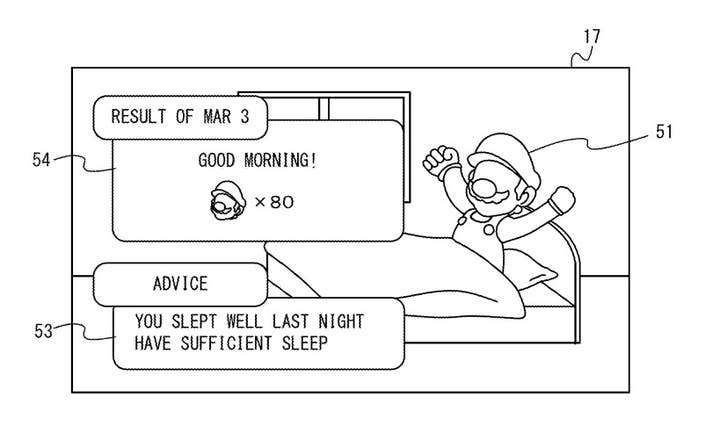
Similar in its wild swings along the neat-to-horrifying spectrum is another patent Nintendo received for the sensor, US patent 10,987,042, which describes how the thing would consist of a handheld unit and a base sensor that users would put on their nightstand also includes a projector to display an image upon the users' ceiling.
That's the neat part. The horrifying part is about the advice. The patent describes a case where a user has "a low emotion index since being scolded by his/her superior at work" and that information is sent to a server at Nintendo. The patent offers a few different ways as to how the server could handle it.
First, there's the innocuous way, telling the user "take a deep breath."
Second, there's the gross way, telling the user to buy something marketed as a stress-relieving item.
Finally, there's the horrifying potential peek into Nintendo's employer-employee relationship dynamics:
"On the other hand," the patent says, "the server may present the notification-subject user with advice information such as 'you should cheer up his/her feelings' or 'you should cook his/her favorite dish.'"
Totes normal response to getting chewed out at work: "Hey boss, cheer up, I made you some meatballs."
Anyway, the point is Nintendo didn't do that sleep sensor thing, either.
Just like Khan, the big part of Nintendo's own strategy that it really nailed was to be more active on the licensing front to bring its brands beyond games.
This isn't to say that absolutely nobody called Nintendo's next steps 10 years ago this month, because we did.
"The key here is to engineer a portable that also effectively functions as a home console when you want that big screen experience"James Brightman
More specifically, our editor-in-chief at the time James Brightman called it in an op-ed calling on Nintendo to "engineer a new portable console hybrid that gives players the best of both worlds."
"What matters most is the games, and Nintendo's first-party efforts have always shined," Brightman said. "The key here is to engineer a portable that also effectively functions as a home console when you want that big screen experience. Merge that portable with a compelling, feature-rich network like Xbox Live or Steam, and suddenly Nintendo is dominating living rooms again."
Brightman called on Nintendo to incorporate traditional controllers into the mobile experience (it did), open the platform up more to indies and better cater to third-parties (it did), and to use cloud streaming as a way to keep the hardware capable of punching above its weight (it has, though it doesn't seem to have been widely used).
In hindsight that all seems like a bunch of very reasonable conclusions about what Nintendo should do given the various trends in the industry around the time and some possible tells like the 2013 merging of its handheld and console software development divisions.
But as Pachter, Khan, and Nintendo itself showed, a lot of people weren't really sure what Nintendo's next steps would be at the time. This was also almost three years before Nintendo would unveil the Switch and confirm the hybrid console gimmick. And even after that gimmick was unveiled, there was no shortage of people doubting its potential.
This column doesn't exist to pat ourselves on the back, but Brightman played the oldest fool's game in the industry and he came out unscathed. I think that's worth a couple pats.
What else happened in January of 2014
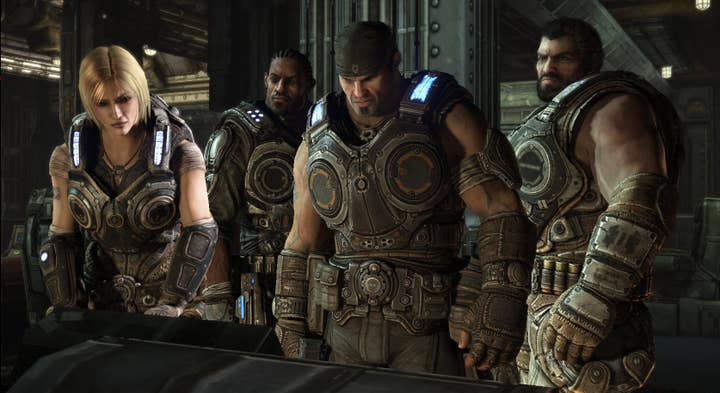
● Microsoft acquired the Gears of War franchise from Epic and turned the keys over to its Vancouver-based Black Tusk Studios, which would later be renamed The Coalition. For a few years there, Gears was right up there with Halo as the blockbuster system-selling franchise for the top console among traditional gamers, but if you were to make a list of the Top 20 franchises in gaming, would Gears make the cut now? Top 50?
While the reviews since the Microsoft acquisition (covering Gears of War 4, Gears 5, and Gears Tactics) are down a step from the original trilogy, they've all done better (and seemed to be more highly regarded) than the final pre-acquisition release, Gears of War Judgment. Did people just get burned out on cover-based shooting after years of Gears and its imitators?
● In an interview with OXM, Xbox head Phil Spencer revealed that Microsoft almost had a very different reaction to the backlash around the Xbox One's originally announced digital restrictions. Instead of reversing course on mandatory online connections and limits on used games, Spencer said "there was a real discussion about whether we should have an optical disc drive in Xbox One or if we could get away with a purely disc-less console."
It would have been beyond fascinating if, upon identifying a consumer base upset about restrictions on physical media, Microsoft chose to do away with physical media entirely. If you're writing an alternate history novel set in a world where Microsoft gave up on video games, that's a very weird thing to be doing, but this would be pretty easy thing to use as a timeline-changing incident.
● Apple agreed to refund customers at least $32.5 million in a settlement with the Federal Trade Commission over unauthorized purchases because if a parent entered their password to make a purchase in a game for their kid, the app would let the kid make unlimited purchases on that account for the next 15 minutes without asking for another password, and Apple never made this clear to users.
Apple CEO Tim Cook whined about unfair treatment, saying, "It doesn't feel right for the FTC to sue over a case that had already been settled. To us, it smacked of double jeopardy."
My sympathies, Tim. I know it sucks to pay for something and then discover 15 minutes later you're getting charged for it again.
● Activision Blizzard got out of the Marvel games business, with a number of Spider-Man and X-men titles being pulled from online stores (including the previous summer's Deadpool game). The company briefly reunited with Marvel for re-releases of Deadpool, a Marvel: Ultimate Alliance remaster and the Amazing Spider-Man 2 movie-based game, but it has largely steered clear of the license in the past decade, investing more in its owned IP over licensed fare.
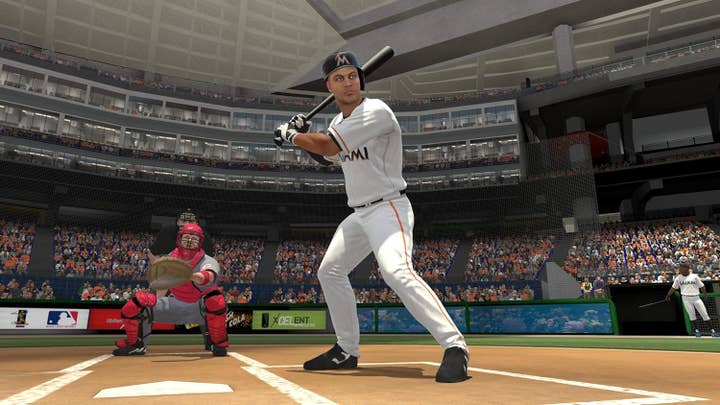
● Take-Two Interactive hung up the cleats, confirming that it would not be continuing its MLB 2K series and leaving Sony's MLB: The Show as the reigning king of the diamond. Take-Two entered into a long-term exclusive deal with MLB in 2005 in what was most clearly seen as a retaliatory defensive move after Electronic Arts signed an exclusive pact for the NFL in 2004, dooming the 2K Sports NFL franchise.
Unfortunately for Take-Two, it paid too much for the MLB license and was losing up to $35 million annually on the deal. That exclusive deal expired in 2013 and Take-Two signed a new non-exclusive pact that kept the MLB 2K series alive for one more go, but it apparently still wasn't making financial sense to continue the franchise.
As much as that MLB deal was an albatross around Take-Two's neck for years, it turned out pretty well in the long run. After all, prior to the deal, Take-Two was only publishing the various 2K sports games, with Sega's Visual Concepts studio handling development duties. EA's NFL exclusivity threw the operation into upheaval, and Take-Two seized on the opportunity, acquiring Visual Concepts from Sega for just $24 million simultaneously with the signing of the MLB deal.
So even though the MLB deal was being criticized as overvalued from day one, Take-Two has still come out ahead thanks to Visual Concepts, whose NBA 2K series has consistently played the Harlem Globetrotters to EA's Washington Generals-esque NBA Live franchise. NBA Live has spent most of the past decade riding the pine, and not because of any exclusivity deal but because more often than not, EA just hasn't been able to make NBA games it felt were worth releasing.
● Zynga began accepting Bitcoin in games like FarmVille 2. So if you know anyone who bought a $100 package of Farm Bucks or whatever using Bitcoin a decade ago, the "money" they paid for it would be worth about $4,300 as of this writing. Or $32 in November of 2015. Or $6,440 in November of 2021. Or $517 in March of 2020.
Granted, there are a few layers of abstraction here in the fake money people are spending for fake money and how we keep assigning them values of actual money. Still, I think buyer's remorse and the constant idea of "What if Bitcoin prices surge right after I buy something?" is preventing it from being a reasonable way to pay for goods and services, but simultaneously helping prop up prices on Bitcoin far longer than it has had any reason to be propped up.

● EA added an offline option for its "always-online" SimCity. But because everything in games is miserably difficult to do, and doubly so if you don't plan it out ahead of time, the company said it took more than six months of work to make the mode. This is why every company making any game with online dependencies needs to be building in end-of-service contingencies to keep games playable from the start (or better yet, not building such dependencies in the first place). Because no dev team or company is guaranteed tomorrow in this industry, and if everything hits the fan, you're not going to be in a position to spend six months making a game playable.
● During its CES keynote, Sony announced PlayStation Now, its entry into the world of streaming. As neat as streaming tech is, it was pretty clear from the word go that this wasn't going to be a game changer for Sony. Our own staff roundtable was uniformly unimpressed, and I wouldn't even call that another pat on the back because I think you would have been hard-pressed to find anyone who thought the initial version of PlayStation Now was going to be a bit hit, particularly with its original rental-based business model.
Good Call, Bad Call
Since we devoted the main write-up to a particularly Good Call, we're going to try to reset the karmic balance of the column and skip the Good Calls this month. It may also have a little to do with the fact that the closest thing we found to a Good Call this month was a report that Satya Nadella would be named to the vacant Microsoft CEO position, which was less a prediction than someone catching wind of actual news a few days early.
So without further ado, let's dig into the bad stuff.
BAD CALL: You would expect Oculus CEO Brendan Iribe to be a true believer in VR, but he was perhaps taking it a bit far when he predicted VR would replace the market of display technology that wasn't strapped to a user's face, saying, "It's my belief that the age of 2D monitors has run its course."
BAD CALL: What do you think of when you hear the word "iPod"? Now if someone asked you to name "the iPod of handheld gaming," what would you say?
Did you say Sony's notorious flop of a handheld the PlayStation Vita? Presumably not. But PlayStation UK Managing Director Fergal Gara was a free-thinking maverick, and he suggested that was a perfectly normal thing to do because the digital/physical mix on Vita skewed more digital than it did on PS3.
"It's interesting and it demonstrates how many people look at it as the iPod of handheld gaming," Gara said.
Many people are calling that ridiculous. We won't say who, exactly. But many, many people.
BAD CALL: In a blog post decrying the "culture of rampant sales," indie developer Jason Rohrer explains that his then-upcoming game The Castle Doctrine would only ever get more expensive, explaining that "sales screw your fans."
Now this isn't a bad call because I necessarily think he's wrong about that. This is a Bad Call because he was making a point as a matter of principle, promising that, "If you want to wait until launch on Steam, you can get it for 25% off if you buy it during the first week (ending February 4). Otherwise, the game will be full price at $16 forever after that."
Yet somehow when we last checked, the game was selling for just $4 on Steam.
SHADY CALLS: Months after the Xbox One launch marketing campaign, Ars Technica reported on a leaked contract Microsoft and Machinima had with various influencers that gave them money in exchange for promoting the system, but with the caveat that they couldn't say anything bad about the system and they couldn't disclose that they had been paid to advertise the system.
That went above and beyond "blatant dirtbaggery" and into the realm of "actually illegal," as would be made clear by the resulting FTC settlement with Machinima (which served as the middleman between Microsoft and the influencers and stipulated the non-disclosure).
It was also, as Microsoft and Machinima stated in their initial response to the scandal, "a typical marketing partnership."
Note to publishers: "Everybody else is doing it" isn't a valid excuse for unethical and/or illegal actions. Epic tried that one and it cost the company half a billion dollars.
Later in the month, when EA's own shady influencer marketing program received scrutiny for its practices, the publisher said it requires participants to comply with FTC guidelines and identify when content is sponsored. However, a leaked set of terms presented to influencers revealed that they were required "to keep confidential at all times all matters relating to" the deal, which sure sounds like EA wanted to have its cake and eat it too, covering its own backside while leaving the influencers on the hook for any resulting legal action.
Finally, we found out that late night talk show host Conan O'Brien charged $35,000 to have games featured on his Clueless Gamer segments, which likewise were never disclosed to the audience as advertisements.
Were we wrong to expect more honest labelling from the person behind The Masturbating Bear?
